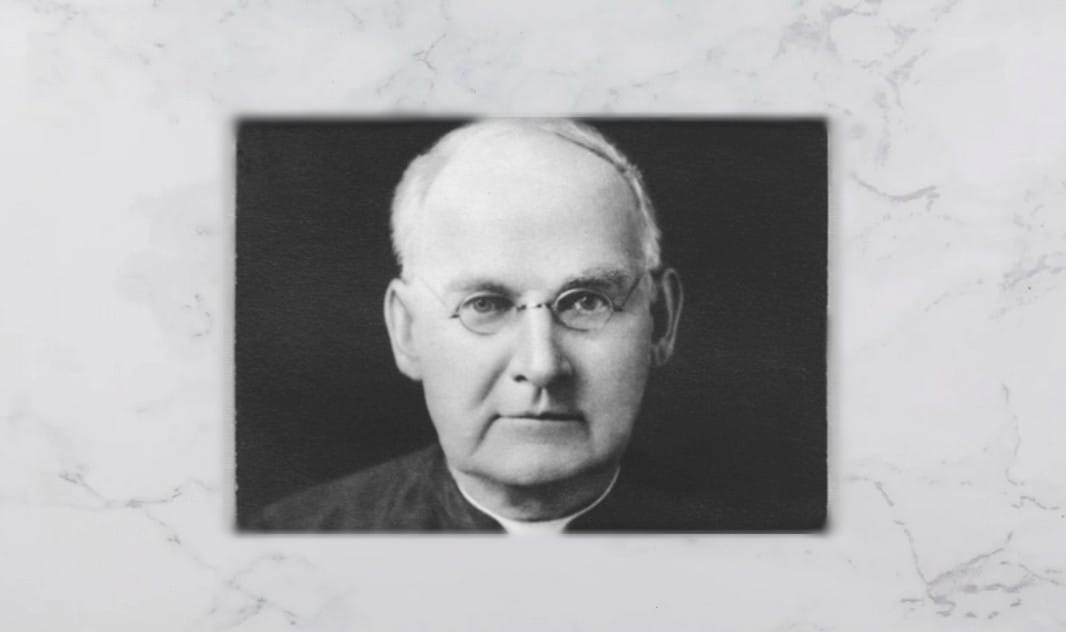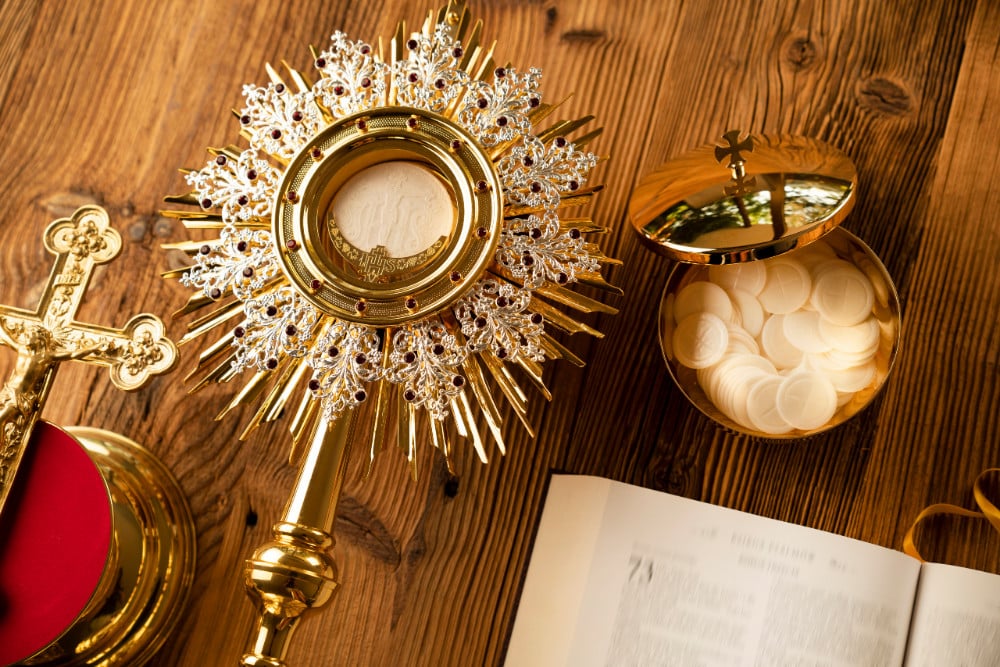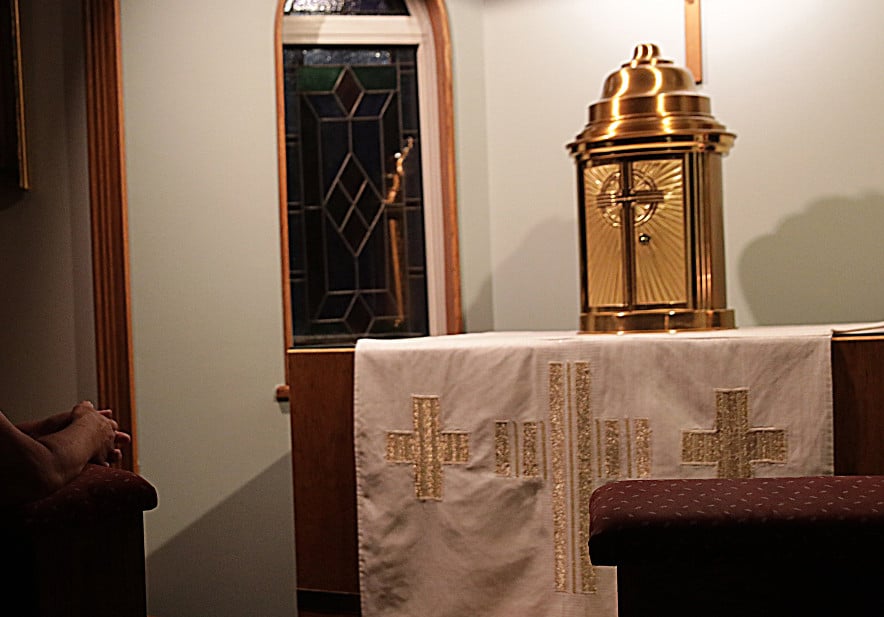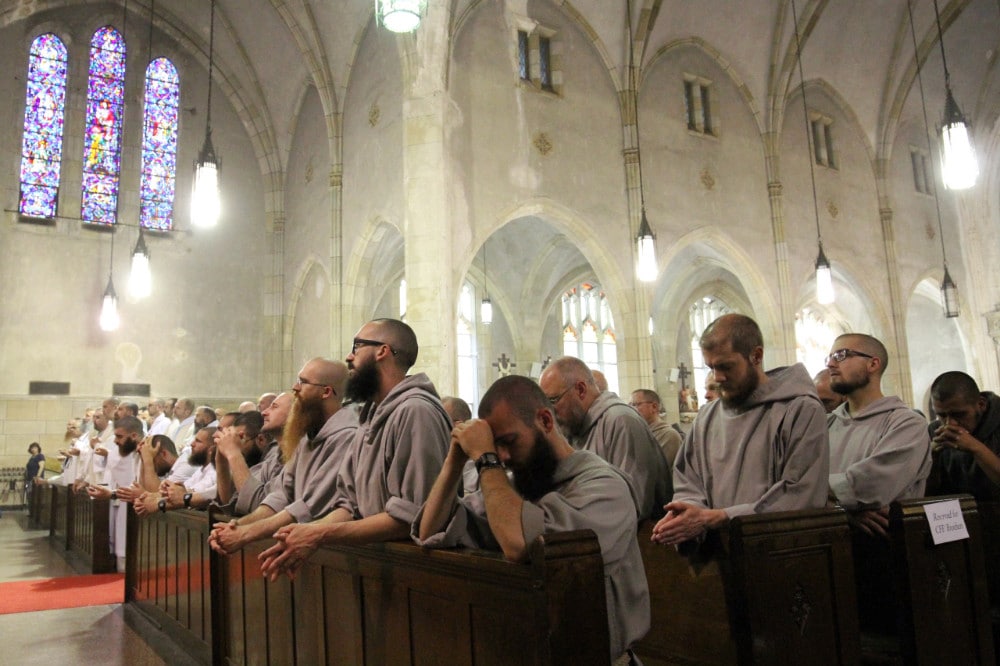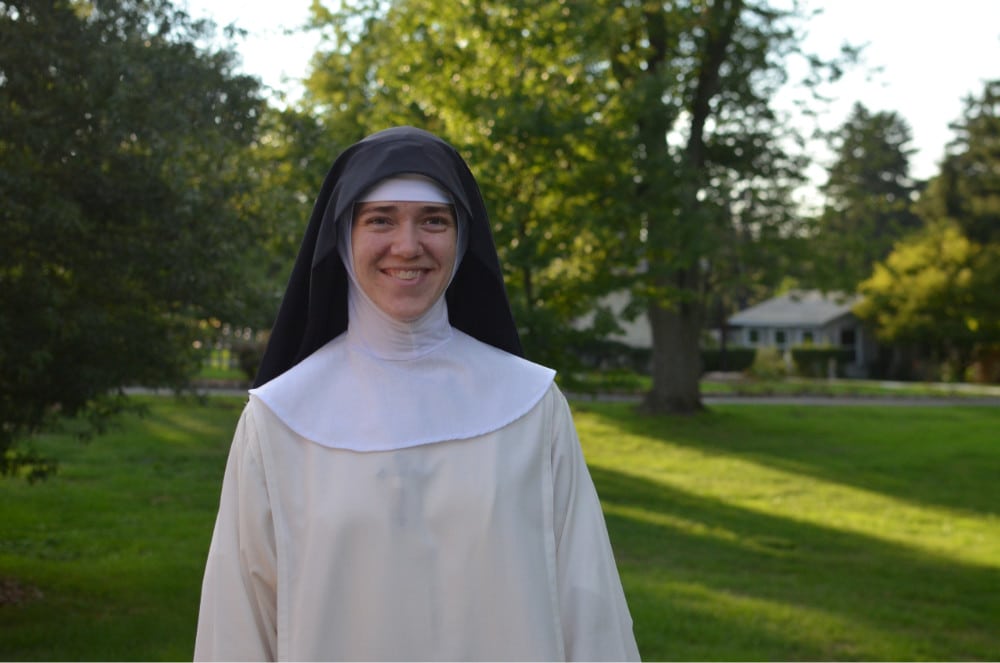When you read the phrase “spiritual direction,” what comes to mind? Monks in a monastery? Nuns in a cloister? Saints?
Have you ever thought that spiritual direction might be meant for you?
Spiritual direction is intended for anyone who is serious about drawing closer to Christ and discovering how they might hear God speaking more clearly through the events of daily life. If you are a faithful Catholic who regularly participates in the sacraments but feels called to “more” (whatever that might mean to you), spiritual direction may be the tool you need to take your faith life to the next level.
In an article in the Journal of Psychology and Theology, spiritual director Father Gene Barrette writes that spiritual direction is “the help or guidance that a person (directee) seeks and another (director) gives over a period of time in the process of growing closer to God.”
Father Barrette goes on to identify five goals of spiritual direction:
-
- Help the directee understand and live out his or her unique relationship with God.
- Help the directee live as an authentic disciple of Jesus Christ in their daily life.
- Enable the directee to use spiritual tools like prayer/spiritual reading, meditation, asceticism (i.e fasting, abstinence, penance) and other resources in a healthy and personalized way to nurture their developing relationship with God.
- Enable the directee to recognize, disarm and eliminate whatever internal or external forces seek to undermine the growing relationship between God and the directee.
- Equip the directee to live the power and fruits of their growing relationship with God by more effectively witnessing to the kingdom of God in their daily life and relationships.
Who is it for?
Spiritual direction has always been open to anyone, although historically, it was mostly priests and religious who took advantage of this resource. The Second Vatican Council challenged the status quo when it asserted, “all the faithful of Christ of whatever rank or status, are called to the fullness of the Christian life and to the perfection of charity” (Lumen Gentium, No. 40). Spiritual direction is one of the most powerful tools the Church gives us for living the “fullness of the Christian life.” The Church invites all people, lay and religious, to take advantage of it.
There are certain habits a Christian should ideally have cultivated before looking for a spiritual director. Spiritual direction generally assumes that a directee is well-established in their basic spiritual practices. Ideally, the person seeking a director should already be regularly participating in the sacraments (especially confession and the Eucharist), have a regular personal prayer life, be used to some degree of fasting and charitable giving, and engaged in some kind of ministry work (which, it should be noted, includes raising a family and working to pass one’s faith on to one’s children). Practices like these are the fundamentals of Christian discipleship. For the most part, spiritual directors don’t exist to teach disciples to walk so much as run.

Even so, these are not hard and fast requirements. For example, someone who was never taught to have a meaningful personal prayer life but is actively engaged in the sacramental life of the Church and longs for a more personal relationship with God could be a perfectly appropriate candidate for spiritual direction. The same could be said for someone who was regularly receiving the sacraments, but who was struggling to discern God’s will or establish good spiritual habits. In this case, a spiritual director could provide either counsel on listening to God, or accountability that could help the directee cultivate a more intentional spiritual life. These are just a few examples. If it is on your heart to consider spiritual direction, the best course of action would be to talk with your pastor — or someone you might like to serve as a spiritual director, like a religious sister or a trained layperson — and discuss what spiritual direction might look like for you. Every Christian has a right to seek and receive the support they need to draw closer to Christ, to know his will for their lives, and to live the fruitful and abundant life God is calling them to. If you want to draw closer to Christ but aren’t sure what the next steps might be, speak to someone in the Church about whether spiritual direction — or some other kind of spiritual assistance — might be for you.
| Who needs spiritual direction? People like you! |
|---|
| Every Christian who is serious about growing closer to God and knowing his will for their lives can benefit from spiritual direction. Here are just a few examples of the kinds of situations that could inspire someone to seek spiritual direction:
Marta “I love being with my kids but also miss my job. I liked feeling productive, and I enjoyed being around other adults. Plus, the extra money would be really helpful as they get to school age. I’m just not sure what the right thing to do is? How do I know what God wants for my family and me?”
“I was raised Catholic, but I mostly just went along with it because of my parents. I never really thought about what it meant for me.” After the retreat, Nico started attending Mass regularly and taking some daily time for daily prayer. Overall, it’s been a positive experience for him, but it’s also left him with a lot of questions. “I guess I’m wondering what God wants from me. Why did he have me go on that retreat? What does he want from me now? The pastor was talking about vocations last Sunday. Sometimes I wonder if God had me go on that retreat because he wants me to be a priest. I’ve never really thought about that before. All my friends — even my Catholic ones — would probably think I lost my mind. I mean, I know God has a plan for my life, but how do I figure out what it is?”
“I didn’t know what else to do. I started praying like it was my full-time job. I’d never been that raw and honest with God before. Some days I screamed at him. Some days I couldn’t stop sobbing. Other days, I just stared at the cross on my bedroom wall as my thoughts spun out.” Now that she is in remission. Erin would like to know how to develop her relationship with God. “Faith was always important to me in some way, but I feel like I’m in a very different place. I wouldn’t wish what I went through on my worst enemy, but because of everything I went through, for the first time, I’m relating to God not just as a concept or being but as a real person. I know he loves me and wants a deeper relationship with me. But I don’t really know what that means.”
Gabriela said: “During marriage prep, our sponsor couple talked about the importance of praying together. We sometimes say the Rosary, and we pray Grace and things like that, but we don’t really know what it means to pray together on a deeper level.” They moved to a new city after marriage, losing contact with their sponsor couple. Vic said: “We didn’t have time to follow it up then. We were so busy getting ready for the wedding. But I guess we got the impression that we were missing out somehow by not having more of a couple prayer-life. I think we’re both serious about making God part of our everyday life together, but we don’t know where to start.”
“Leia and I always prayed together. And I just … can’t anymore. Why would God let this happen? I know I shouldn’t be, but I’m just so angry at God. I look at my kids and think, ‘How could a loving God take their mother away from them?’ I force myself to go to Church because I know that’s what she would have wanted, but, mostly, I either just focus on trying to keep the kids in line, or I just close my eyes and let it all wash over me. None of it means anything anymore. I know it’s not supposed to be like that, but I don’t know what else to do.” |
What should I be looking for? How do I find a spiritual director?
Although, historically, most spiritual directors were priests and religious brothers or sisters, trained laypeople have increasingly been stepping into the role. The smaller numbers of priests and religious who are trained to give (or are available for) spiritual direction, combined with the Church’s call to admit laypeople to the practice, has led Catholic colleges and other religious institutes to offer certificate programs in spiritual direction and accompaniment. When looking for a director, choose the person with the best training, formation and Christian maturity.
ACADEMIC PREPARATION
There are no specific academic requirements to becoming a spiritual director. Spiritual directors may or may not be certified by a religious institution or Catholic university. Most people (priests, religious or lay) who serve as professional spiritual directors have at least a master’s degree in theology or ministry. Many pastoral counselors (licensed counselors with advanced theological training) also serve as spiritual directors. The most important qualities in a good director are spiritual maturity and personal integration. You want to find a person who lives a well-balanced life and who demonstrates a capacity for meaningfully living their faith in the real world. These qualities matter much more in a spiritual director than a degree. That said, without proper academic preparation, which gives a director an understanding of the various spiritualities that have been tested and approved by the Church, spiritual direction can become idiosyncratic, driven by the ego or whims of the director. Your spiritual director needs to be prepared to help you understand what it means to hear God’s call for your life and live your Catholic faith more fully in your specific circumstances. Having broader training in the Church’s established and respected spiritual systems (Ignatian, Franciscan, Carmelite, Carthusian, Dominican, Benedictine, etc.) is important to this end. Make sure to ask questions about the training a potential director has received.
CHRISTIAN FORMATION
The U.S. Conference of Catholic Bishops’ document, “Co-Workers in the Vineyard of the Lord,” outlines four categories of formation that are essential for effective ministry. These include human, intellectual, spiritual and pastoral formation. A good spiritual director will display an admirable level of maturity in these four areas.
Human formation
Human formation is the most important of these four categories. It refers to a person’s ability to live an integrated, healthy and meaningful life. This capacity affects a minister’s ability to cooperate with grace, hear the Holy Spirit clearly, and live their faith in an authentic and pastoral manner. Spiritual direction is meant to help the Christian seek wholeness and integration. Does your potential director practice habits that enable them to lead a generally mentally, physically and socially healthy life? Do they have healthy attitudes toward people and life, as opposed to being suspicious of people or “the world”? Are they joyful and personable? Do they seem both confident in their role and humble in their ability to listen and learn from others? If your director is going to help you pursue a healthy and godly integration of the different parts of your life, they need to exhibit qualities like this in their own life.
Intellectual formation
Intellectual formation refers to how knowledgeable a person is about the information required to do their work. What is your potential director’s academic background? What spiritual systems are they familiar with (see examples above)? What training or supervision have they received in spiritual direction? Is your potential director able to offer good, practical insights for integrating your faith and life while avoiding too-easy answers or one-size-fits-all advice?
Spiritual formation
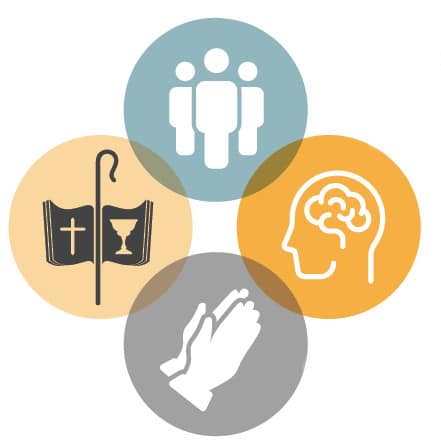 Spiritual formation has to do with a person’s spiritual practices, their relationship with God, and their practice of the Faith. What is your potential director’s relationship with God and the Church? Is your potential director in love with Christ? Does he or she have an active and fruitful prayer life? Is he or she good at listening to God speaking through the events of his or her daily life? Is your director knowledgeable and supportive of the teachings of the Church? To the best of your knowledge, does your potential director see the teachings of the Church as a path to help him or her achieve personal and spiritual integrity (as opposed to having a dismissive or rigid attitude toward Church teaching)? Even if your path of life is different from your director, as a Catholic, your spiritual director should be able to model how Catholic spirituality and teaching can lead to a deeper relationship with God and a more integrated life.
Spiritual formation has to do with a person’s spiritual practices, their relationship with God, and their practice of the Faith. What is your potential director’s relationship with God and the Church? Is your potential director in love with Christ? Does he or she have an active and fruitful prayer life? Is he or she good at listening to God speaking through the events of his or her daily life? Is your director knowledgeable and supportive of the teachings of the Church? To the best of your knowledge, does your potential director see the teachings of the Church as a path to help him or her achieve personal and spiritual integrity (as opposed to having a dismissive or rigid attitude toward Church teaching)? Even if your path of life is different from your director, as a Catholic, your spiritual director should be able to model how Catholic spirituality and teaching can lead to a deeper relationship with God and a more integrated life.
Pastoral formation
Pastoral formation has to do with a director’s capacity for wisdom, defined as having insight into how to live the teachings of Scripture and the Church in a manner that is both faithful and respectful of the unique circumstances of your life. Beyond their capacity to live Catholic spirituality and teaching in their own life, is your director capable of guiding you through the unique challenges those teachings may present in your life? Are they able to demonstrate both confidence and compassion in their efforts to help you discover the unique path God is asking you to walk?
Because spiritual direction is about helping people seek a healthy integration of faith and life, avoid would-be directors who either make light of Church teaching and traditional spiritual practices or have a too-rigid, black-and-white approach to applying Church teaching and spirituality to the challenges of daily life. People who exhibit these qualities may be well-intentioned, and they may even function well enough in a particular ministry role, but they lack the personal and spiritual maturity required of competent spiritual directors.
Counseling, pastoral counseling, coaching and spiritual direction — what’s the difference?
People often wonder what the difference is between counseling, pastoral counseling and spiritual direction. Many people are involved in more than one of these types of services. How do you know which is best for you? Or, if you are working with more than one professional, how do you know what to expect from each relationship?
Clinical counseling
Clinical counselors (counselors, clinical social workers, marriage and family therapists, psychologists) are state-licensed mental health professionals who have at least a master’s degree in a mental health-related discipline and at least two years of postgraduate supervision in treating emotional, behavioral and mental disorders. Clinical counseling is focused on using psychological techniques to resolve specific problems. The counseling relationship is meant to be time-limited, ending when satisfactory progress on a particular problem has been made.

In general, although professional standards of the various professional boards encourage so-called “religion-spiritual-cultural competency,” most secular counselors are taught to avoid religious or spiritual conversation in session. In general, secular counselors are ill-equipped to help clients address the spiritual elements of their problems or integrate spiritual tools into counseling. Research shows that many secular counselors are actually quite hostile to their clients’ faith and spiritual practices if those practices are seen to be an obstacle to the counselor’s plan for progress.
Pastoral counseling
Pastoral counselors are licensed mental health professionals (as above) who have advanced, post-graduate theological training that enables them to apply both psychological tools and spiritual practices and insights to mental, emotional, relational or spiritual problems. Although pastoral counselors are qualified (by their licensure) to function as clinical counselors (see above), depending upon where they work, they may or may not function in a clinical capacity.
Many pastoral counselors serve as “clinically informed spiritual directors,” helping clients live the Catholic vision of life or relationships in the face of the problems or challenges they are going through. For instance, where a clinical counselor might strictly be focused on helping a client heal from depression, a pastoral counselor might be primarily concerned with how a client’s depression is holding them back from living a meaningful, virtuous life and having relationships that reflect the Catholic vision of marriage or family life. In this latter case, the pastoral counselor will help the client apply spiritual and psychological tools to address their depression, but they will do so primarily as a means to the greater goal of living a more faithful life. In this way, a pastoral counselor is functioning in more of a ministerial capacity that is outside the role of a clinical counselor.
In addition to having solid clinical counseling credentials, the most qualified pastoral counselors are members of the Association for Clinical Pastoral Education and are certified as “Spiritually Integrated Psychotherapists” by the ACPE.
Spiritual direction
Counseling (whether clinical or pastoral) is primarily focused on either solving particular problems or achieving measurable goals. Spiritual direction is concerned with accompanying the person and helping them find God — and discern God’s will — in whatever circumstance they find themselves. A spiritual director is not qualified to teach life skills or help a directee solve problems. So, while a counselor (either clinical or pastoral) would focus on alleviating a client’s suffering, a spiritual director would be more focused on helping the directee find God in the midst of their suffering.
This can sometimes lead to confusion where some directees who are also in counseling will tell their therapists, “I can’t (leave X painful situation/heal from Y emotional problem) because it is the source of great spiritual fruit in my life.” When dealing with clients who are struggling with emotional or relational problems, good spiritual directors will help directees find God in their current pain, and refer them to people who will help them develop the skills to resolve that painful situation. They will then help their directee continue to find God in those new, healthier circumstances. Where counseling of various types is time-limited and goal-focused. Spiritual direction is often a lifelong process of accompaniment on the directees road to holiness.
Catholic life coaching
Life coaching is a relatively new field. A professional life coach is not a counselor. They do not solve problems, per se. That said, depending on their training, a Christian life coach could function as a spiritual director. Life coaches help clients identify the strengths they already possess and apply those existing strengths to new challenges. They can also teach skills that help clients improve their performance and achieve greater personal, professional, or relationship success. As spiritual directors, Christian Life Coaches tend to focus a bit more on teaching skills than on merely accompanying, but this will vary greatly depending upon the provider.
The easiest way to understand the difference between counseling (clinical or pastoral), life coaching and spiritual direction is to think of the different roles of the baseball coach, the team physical therapist and the team chaplain. The baseball coach can teach a player to run faster, throw harder or catch better, but if the player is experiencing pain that makes it difficult to use those techniques, the coach will refer the player to physical therapy. The team chaplain will be there to offer the player prayer and spiritual support whether the player is on the field or in the clinic. Similarly, a life coach teaches skills, a counselor heals the pain that prevents the person from using those skills effectively and consistently, and a spiritual director accompanies a person with spiritual support wherever they happen to find themselves.
As an unregulated field, life coaching comes with a “buyer beware” label. Anyone can legally set themselves up as a life coach. The best coaches have graduate degrees in a helping profession (psychology, ministry, education, or the specific field in which they coach) and are Board Certified Coaches (BCC) by CCE-Global, the paraprofessional division of the National Board of Certified Counselors. If the life coach provides personal or relationship guidance, they should also either be a mental health professional themselves or work closely with a professional counselor (pastoral or clinical) who is able to provide supervision and assistance when a coaching client needs more therapeutic support. Consumers should avoid coaches who do not have these credentials.
Dr. Greg Popcak is an author and the director of CatholicCounselors.com.



 Nico
Nico Erin
Erin Gabriela and Vic
Gabriela and Vic Paul
Paul